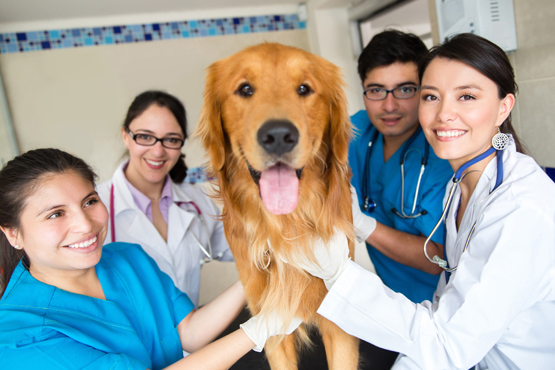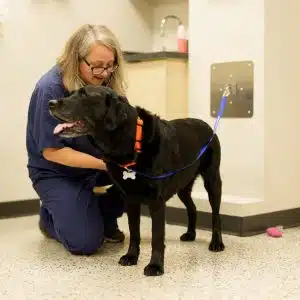Top points to understand prior to visiting a Veterinary Oncologist
Wiki Article
The Importance of Early Discovery: Insights From a Veterinary Oncologist
Early detection of cancer in pets is a crucial topic for pet dog proprietors and veterinary experts alike. Veterinary oncologists highlight the value of acknowledging subtle indicators that might suggest severe health problems. Common signs and symptoms typically go unnoticed up until they intensify. Recognizing these very early caution indicators and advancements in diagnostic methods can make a substantial difference. What steps can family pet owners take to enhance their family pets' opportunities of early diagnosis and better treatment results?Recognizing Cancer Cells in Family Pets: Common Types and Signs And Symptoms
While numerous pet dog owners might not recognize it, cancer cells is a substantial health concern affecting pets, just like it performs in human beings. Typical types of cancer in animals include lymphoma, mast cell tumors, osteosarcoma, and mammary lumps. These malignancies can show up in numerous means, depending on their place and type. Signs frequently consist of inexplicable fat burning, persistent vomiting, changes in hunger, or unusual lumps and bumps. Pets might also show sleepiness, trouble breathing, or unwillingness to workout, which can show underlying health and wellness problems. Early signs can be refined, making it crucial for animal owners to be observant of their family pets' habits and physical condition. Understanding these usual kinds and connected symptoms can equip owners to seek veterinary treatment promptly, potentially causing earlier diagnosis and therapy alternatives. Acknowledging the indicators of cancer cells in animals is a vital step towards boosting their health and lifestyle.The Function of Veterinary Oncologists in Very Early Detection
Vet oncologists play a necessary duty in the very early detection of cancer in animals, as their specialized training outfits them with the abilities necessary to determine subtle signs that might be overlooked by family doctors. They utilize a mix of medical knowledge and progressed diagnostic devices to evaluate individuals thoroughly - Veterinary Cancer Specialist. By acknowledging very early symptoms and risk elements, oncologists can direct family pet proprietors toward timely interventions, raising the opportunities of effective therapyVeterinary oncologists usually team up with basic specialists to develop screening protocols tailored to particular breeds or age teams, boosting the effectiveness of very early discovery initiatives. They inform pet dog proprietors on the relevance of normal check-ups and awareness of modifications in habits or physical condition. Through these proactive steps, veterinary oncologists considerably contribute to improving outcomes for pets diagnosed with cancer, emphasizing the essential nature of their duty in veterinary medical care.
Developments in Diagnostic Techniques for Pet Cancer
Innovations in diagnostic methods have substantially boosted the capability to find cancer cells in pet dogs at earlier stages. Methods such as innovative imaging, including MRI and CT scans, supply detailed inner views, allowing vets to determine tumors that might not be apparent. Additionally, the advancement of minimally invasive procedures, such as great needle aspirates and biopsies, allows precise sampling of cells for histopathological evaluation with reduced tension for the pet.Emerging molecular diagnostics, including hereditary screening and biomarker identification, are changing the landscape of vet oncology. These methods can identify particular cancer types and predict feedbacks to therapy, assisting in individualized treatment plans. Additionally, innovations in research laboratory methods, such as liquid biopsies, are starting to supply non-invasive choices for keeping an eye on tumor development and therapy efficacy. Collectively, these technologies represent a significant jump onward in veterinary medicine, stressing the crucial role of very early discovery in redirected here improving results for family pets diagnosed with cancer.
How Animal Owners Can Identify Indication
Just how can pet dog proprietors come to be alert in recognizing possible indication of cancer cells? Recognition of physical and behavior modifications in pet dogs is necessary. Typical indications include unusual lethargy, anorexia nervosa, or unexpected weight modifications. Pet owners must likewise take note of consistent throwing up or looseness of the bowels, which might signal underlying concerns.Adjustments in the skin, such as lumps, bumps, or sores that do not recover, call for prompt vet focus. Additionally, proprietors need to note changes in drinking practices, enhanced peeing, or problem in breathing. Unexplained hopping or pain may likewise be indicators of even more serious problems.
Routine vet check-ups can help recognize these indication early. By maintaining a close observation of their pets' wellness and habits, proprietors can play a vital duty in early discovery, possibly resulting in much better outcomes must cancer cells be identified. Acknowledging these signs might significantly influence an animal's lifestyle.
The Influence of Early Discovery on Treatment Outcomes
Early detection of cancer cells in pet dogs plays a necessary role in identifying treatment outcomes, as it commonly permits a broader series of healing options. When cancer is diagnosed in its onset, vets can implement less intrusive therapies, enhancing the possibility of successful intervention. Early-stage cancers may also respond far better to radiation treatment or radiation, causing improved survival prices and general lifestyle for the family pet.Additionally, prompt medical diagnosis assists in a much more tailored treatment strategy, lining up with the certain demands of the animal. This can include individualized drug regimens or medical interventions that are less aggressive. Alternatively, late-stage discovery often results in limited options, much more hostile treatments, and poorer diagnoses. The relevance of very early detection can not be overemphasized; it essentially modifies the trajectory of treatment, making it crucial for family pet proprietors to stay watchful for any type of signs of health problem in their beloved companions.
Regularly Asked Questions

Exactly How Can Diet Plan Influence Cancer Cells Risk in Pet Dogs?
Diet regimen substantially influences cancer threat in pets, as particular nutrients and food types can either inhibit or promote tumor growth. A well balanced, nutrient-rich diet might help in reducing the probability of developing cancer cells in pets.
Are Specific Types A Lot More Prone to Cancer cells?
Specific pet types, such as Golden Retrievers and Fighters, exhibit higher cancer vulnerability due to hereditary predispositions. Some feline types additionally show boosted cancer cells dangers, highlighting the relevance of breed-specific health awareness among family pet proprietors.
What Are the Costs Connected With Early Cancer Detection?
The costs related to early cancer discovery can differ greatly, encompassing analysis tests, appointments, and possible therapies - Veterinary Cancer Specialist. Buying these services often brings about better wellness results, eventually minimizing a lot more substantial future clinical expendituresCan Vaccinations Stop Cancer in Pets?


Injections might decrease the risk of particular cancers in pets, particularly those linked to viral infections. Their performance differs, and animal owners ought to speak with veterinarians for customized advice regarding vaccination and cancer cells avoidance approaches.
How Usually Should Family Pets Be Screened for Cancer cells?
Pet dogs must usually be screened for cancer cells annually, specifically as they age or if they display danger factors. Normal veterinary check-ups can help identify prospective concerns early, improving treatment end results and general health and wellness administration.Early discovery of cancer cells in family pets is an important topic for family pet proprietors and veterinary professionals alike. Early indications can be subtle, making it vital for pet proprietors to be watchful of their animals' actions and physical problem. Veterinary oncologists play a necessary role in the early detection of cancer in pets, as their specialized training equips them with the abilities essential to recognize refined indicators that might be forgotten by basic practitioners. By maintaining a close monitoring of their family pets' health website link and actions, proprietors can play a vital duty in early detection, possibly leading to better end results ought to cancer be diagnosed. Early discovery of cancer cells in pets plays a necessary function in figuring out visit this web-site therapy results, as it usually allows for a broader range of therapeutic alternatives.
Report this wiki page